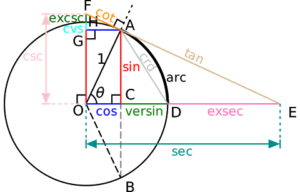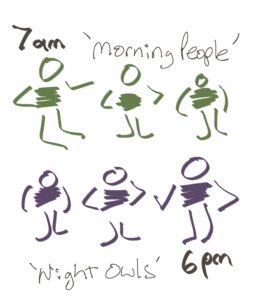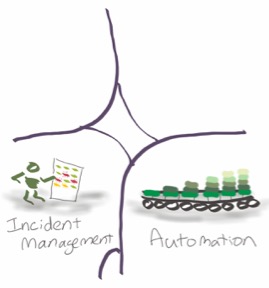The A-Ruminations team discuss Healthy Tension.
Category Archives: Collaboration
015 Digital Communications
The A-Ruminations team discuss the Hidden Dangers of Digital Communitcations, such as Slack.
What are the hidden costs and consequences?
014 Convenience Vs Strength
The A-Ruminations team discuss the idea of Convenience Vs Strength.
What we give Up and Why?
007 Collaboration
The A-Ruminations team discuss and analyse Collaboration and what it means.
005 It’s Not Who You Know, It’s How You Know Who You Know
Kim, Tobbe and Steve discuss – It’s not Who You Know It’s How you Know Who You Know.
Positives and pitfalls of Social Networking, Company perceptions and Honest Relationships.
PROCESSES LEAD TO CHAOS, DEFINED PROCESSES LEAD TO SUCCESS.
To help understand the idea behind the statement that processes lead to chaos and defined process lead to success, consider a trip to any location say Healesville. We could drive, catch the bus, walk, run or ride our bicycle, even fly or parachute in to Healesville, these are all modes of transport. Next we could go via Lillydale, Kinglake or Yarra Glen, these are the three most direct routes possible from our location, these are the routes of journey.
Can you imagine the chaos that would ensue trying to work out who will go, who will stay; who drives, who rides etc and lastly the route we wish to take. You can see the inefficiency of the process if we allow it to go undefined. If leave it undefined we have issues with Who, What, How and When. The when is not only dependent upon the time we choose to be in Healesville but also the mode of transport taken by the people going and the route taken. So by not defining the process, we can easily end up in a state of option paralysis, which results in nothing being done.
Now if we define the process by saying “We are going to drive to Healesville via Yarra Glen, to be there by 1:00pm next Saturday, for lunch (2hrs).” The organisation of the task becomes infinitely easier because many high level decisions have been removed as options and this has forced a focusing of intent. Now finding the answers to Who, What, How and When has been simplified, to much simpler and more logical questions, such as:
Who has a Drivers License?
Who wants to drive? Influenced by road familiarity and road and car conditions.
Who wants to go to Healesville? Influenced by total time and other commitments.
How big a vehicle do we need? Influenced by how many people.
How many vehicles do we need to take? Influenced by how many people.
Be defining the Mode of transport, Route and Time of the Event, departure times and the total time required for the round trip can be defined. If we drive we can say 1hr to get there and 1hr to get back plus 2hrs at the lunch roughly. These estimates also allow us to understand how much of our Saturday afternoon/evening will be taken up and if we will be traveling at night. These factors will influence who may wish to come.
So the better we define the processes we wish to take to get where we are going the higher our chances of success. You may also of noted that high level defined parameters does not remove all freedoms when planning and in fact with this high level guidance we are often liberated to achieve our goals.
The thing that holds the thing that the Stakeholders were holding
 So we all know about stakeholders…those people that care about what we are doing and should have a say in what happens.
So we all know about stakeholders…those people that care about what we are doing and should have a say in what happens.
Are there also people that care about the thing that the stakeholders care about that we would not call stakeholders?
What does the ‘stake’ mean when we refer to the stakeholder? According to Wikipedia, the term originally referred to the person who temporarily held the stakes from a wager until the outcome was determined. Business has since co-opted the term to mean people interested or impacted by the outcome of a project.
Tobbe and I were having burgers for lunch today…they were so tall that they had skewers in them to keep them together. So the chef held the skewer (stake) and we held the skewer when we ate the lunch, but the person serving us never touched the skewer…just the plate that supported the burger with the skewer in it.
That got us thinking about what supports the interests of the stakeholders, and yet, is not a stakeholder of a project or outcome?
It may be what we call governance. The scaffolding in an organisation that ensures that business interests are looked after…ensuring that our burgers arrive safely and without toppling over onto the floor.
ITSM and Cynefin – Lightning Blog
I attended the itSMF 20th Anniversary Conference in Melbourne this week and it was great to see the emphasis from many speakers about automation and using DevOps principles.
The Cynefin Framework is subjective and I was thinking about where many of us see the service management framework and ITIL on it. It is easy to imagine incident management in the chaotic domain and standard change management processes in the obvious domain (highly repeatable and therefore great candidates for automation).
So it was interesting to see the keynote from Lindsay Holmwood titled ‘Mixing Oil and Water: DevOps in an ITSM World’ where Lindsay busted the myth that DevOps and ITSM don’t mix. ITIL and the service management framework are great tools to identify the candidates for automation and for where to ‘build in’ governance to our continuous deployment pipelines.
If we want to get into the market with safe and small changes that take into account operability, security, regulatory requirements, and resilience, we really need to partner with our service management colleagues.
Unintended or invisible consequences
Have you ever tried to do a nice thing that went completely pear shaped ?
Have you ever said something that was taken out of context ?
These are the unforeseen consequences, that surround us every day of our lives. The basic fact is that every interaction is open to misinterpretation. Sounds absurd but I propose it’s painfully true. The fact no one can read your mind or understand precisely what you mean is founded in the variety of life experiences we all have. We all have a “mental rule book” that we inherit/adapt/devise as we live our lives, moulded by our experiences and more importantly, our interpretation and responses to them.
Management and the unintended and invisible consequences
We are a modern culture of goal driven and result focused beings, rushing towards completion. The result is that there is entry level and management and the erosion of the middle.
The loss of the middle
The rush to completion culture, that is modern life, results in an erosion of the middle. Think about it, there is a devaluing and almost loss reflected by the middle layers of our work place and lives. This doesn’t mean that the middle layers don’t exist anymore because they do and if anything there are more of them. What has happened is the middle has expanded all while an erosion of its substance/quality has occurred. The middle has become a waiting room with no intrinsic value, just a place on the way to somewhere else. We are all trying to be/get somewhere else and therefore are focused forward and not in the present. It’s like people who are so busy, thinking of the next thing say, that they actually aren’t listening. They are actually, just frantically scanning /searching for the next sound bite to hang their comments upon. This type of hollowness is symptomatic of the erosion of the middle. This layer has become what I call “fluff” taking up a lot of room but with no real substance. The term busy work, tends to be made for this middle layer. So why has this happened?
Apprentice easy to learn hard to master
I remember buying a backgammon set when I was very young which had an instruction booklet with it. The instructions/rules were rather simple but it ended with this statement “easy to learn but hard to master” this line always resonated with me because I was a moratore’s son and knew that most things are easy to learn but really hard to master. The mastery of a skilled task takes time, time to encounter all possibilities and time to develop responses and reactions to them.
How many of us have learnt things, passed the exams and only years later, does the penny, actualy drop? Only then do we see for the first time what the concepts heart or the true nature of the knowledge was. Maths is littered with these sort of realisations, trigonometry is one.

I remember being told by a professor at university, when I was demonstrating and discussing with him how we learn and teach. He replied you only really learn something when you have to teach it, when you first learn anything, it is really just a getting to know you exercise, like a first date. This introduction allows you to pass an examine but really only superficially introduces you to the concepts involved. This initial exposure familiarises you with specific terms and basic concepts, so when you actually need to know and teach that lesson you can find the solution more easily and make it part of you.
The act of learning is greatly enhanced by teaching, why? The answer is simplicity itself. Everyone sees and exists in the world differently, these differences mean that when you learn something and try to understand it, you frame it in familiar and logical steps, for you anyway. When others try to learn and understand the same lesson they will also try to make sense of it according to their life view and understandings. So it’s obvious that when teaching you will find a continuum of how others perceive and try to understand the lesson. Some will think very much like yourself, others slightly differently and still others will need vastly different points of reference to come to terms with and understand the lesson. Good teachers must and can rephrase and explain things in a variety of ways, this necessity is what makes teaching the best way to learn because it stretches us to examine what we “know” from other perspectives and points of view.
The unforeseen consequence of teaching is you learn much more completely. This takes time and understanding.
So why do we rush to “completion” ?
Our modern culture is densely populated with 5 year plans, strategies, expectations, milestones and the list goes on and on. Every minute of every day in our lives is under constant scrutiny both internally and externally. We must develop and attain certain milestones within culturally expected time frames or we seem to be ineffectual or below the curve.
There is no room or time for mastery, we learn and we move on. The modern view is that “the now” is only a stepping stone to a future goal. The worth of the journey seems lost to us and only the allure of promotion and success is our goal. We have become tradesmen, with no patience or will to develop into master craftsmen. Society accepts the passable, to feed instant gratification and speed. The respect and value of craftsmanship and quality has become subservient to efficiency and greed. The attention span of the modern world is framed by sound bites and popularity poles.
Bread and Circus rule the day, with distractions and being seen as cutting edge, objectives in themselves.
Think about your workplace, how many times do we heard “they’ve been in that dead end job for years”, “they have no ambition” these statements maybe true but only partially so. The fact maybe that the worker derives get pleasure and satisfaction in developing their skills beyond acceptable and into the realm of mastery. Yet we don’t acknowledge this, we only see the same person in the same role, and evaluate this as “what is wrong with them?”
The absolute irony I noted while I was working IT, no matter how expert and skilled the programers were they were never “appreciated” as much as management. In fact it was sad to watch true masters of coding, having to become management so they could earn more money and get some appreciation. The actual engine which kept the company in business was devalued because they were content applying their craft. The ironic topper to this observation, was that graduates who had studied coding, just used coding to get a foot into a company, so they could quickly move into the management streams. Does the saying “too many Chiefs and not enough Indians”, spring to mind.
Words of wisdom from my father an old muratore “It takes hardly any extra effort to do a good job than a bad one.” This is very true, when you actually think about it, how much time, effort and money has been flushed down the toilet by bad projects with little or nothing to show for it?
The unforeseen consequence of our modern society is we rush to our goals and loose sight of the reasons and real benefits why we started in the first place.
There seems to be a disconnect between the limbs and the governing body, the brain. The “new talent” needs mentors to help and aid learning of best practises, while the “wiser” and older ones need the vitality of youth to physically accomplish the task and encourage new exploration into possibilities.
Companies are run like the military, chain of command, need to know and follow orders. They should be run as a biological system or organism, where there are feedback systems with more than one way to elicit change, the nervous system for rapid responses (management) and the endocrine system for slower invasive moderation (cultural).
Natural Flow
I’m a morning person – I like to get my chores out of the way first so that I have more options later in the day. There are others who are night owls, their flow is to stay up later and get things done and then sleep in a little later the next day. These patterns are an example of our natural flow.
 For example, I am writing this post on a Sunday morning because it is the first time this week that I have had the energy and time to do it (after work during the week is harder for me).
For example, I am writing this post on a Sunday morning because it is the first time this week that I have had the energy and time to do it (after work during the week is harder for me).
How does this impact us at work? When working with other people, how often do we stop to ask them about their preferred ways of working. It might be terrible of me to schedule a 7:30am meeting with someone who was a night-owl – but highly effective if that other person was like me and was able to start early. On the other side, how often would we speak up and say that we don’t do our best focused work after 5pm?
We have natural flows and rhythms of working in many other ways
-
Our conversation habits – the gaps we leave between when we start speaking and others have finished (these are also influenced by our geographic culture)
-
The ways that we perform repeatable tasks (such as filling in time sheets, drafting emails, transport between and to/from offices)
-
Ceremonies such as how we start meetings, where we sit/stand how we make tea or coffee
-
Engagement flows – how we greet people and get started with conversations and work items
We are subconsciously observing a lot of these flows whenever we interact with others, but there is a risk that we are misinterpreting our observations. I have also not given my own natural flows much thought aside from the morning person observation already mentioned. I am about to start working on a few small projects with some colleagues and will try having a conversation about preferred working styles in the next month – a good future topic for this blog.

